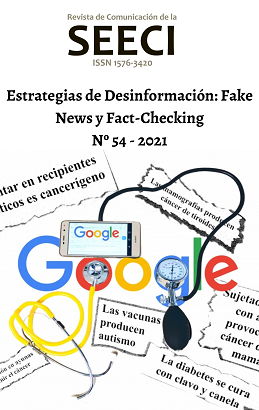ESTRATEGIAS DE DESINFORMACIÓN: FAKE NEWS Y FACT-CHECKIN / Fecha límite: 01 Abril de 2021
Main Article Content
Abstract
Disinformation Strategies: Fake News and Fact-Checking
Disinformation, a defining phenomenon of our time, is absolutely transversal, impossible to reduce to a specific discipline or social sphere. An issue that is one of the main concerns of national security agencies around the world and that, in the professional field, poses important development and reorganization challenges in all fields, from Public Relations, Journalism, Advertising or Marketing, to Medicine or Public Health, through Sociology, Political Science, Law or Economics and Business. A crisis, led by the infodemic (Bennett and Livingston, 2018; European Commission, 2018), with effects such as the lack of confidence in the quality of the information received (Van-Aelst et al., 2017), in the role of the public or private institutions (Waisbord, 2018) and in democracy itself (Levinsky and Ziblatt, 2019), weakened by the risks of platformization (Gerbaudo, 2019), by the use of bots and computational propaganda Woolley and Howard, 2018) as well as by political polarization (Neudert and Marshal, 2019) and the enhancement of permanent confrontation in the face of social consensus.
In this issue of the SEECI journal, therefore, we make a call to the Ibero-American scientific community to submit multidisciplinary articles that contribute to the global knowledge of the phenomenon of disinformation, in general, and of fake news (Wardle and Derakhshan, 2017) and fact-checking (Brennen et al., 2020; Mantzarlis, 2018; Palau-Sampio, 2018), in particular, as well as the advances and concrete solutions that are being investigated or applied in different countries, with a view to focused on the reality and needs of this region of the world.
Keywords: disinformation, fake news, fact-checking, verification, communication, democracy.
Priority lines in this monograph:
- Public Relations, Journalism and Advertising against misinformation in the Iberian Peninsula and Latin America.
- Experiences of fact-checking at the service of journalism in Ibero-American countries: comparative perspective.
- Democracy, political communication, public opinion and misinformation.
- Strategic communication and fake news.
- Persuasion and emotion: analysis of language, content and artificial intelligence.
- Freedom of expression, ethics and transparency in the digital society.
- Digital social networks.
Software, big data, data mining and intelligent systems.
- Communication, Health, Politics and Technologies. The other pandemic: misinformation in times of coronavirus. Automation, bots and algorithms.
Downloads
Article Details
The Journal of Communication of SEECI recognizes and promotes copyright rights, as well as the need to disseminate knowledge in an accessible and equitable manner. Our journal operates under a Creative Commons License CC BY-NC 4.0, which allows authors and users to:
- Share and Adapt: Copy, redistribute, and adapt the material published in the journal in any medium or format.
- Attribution: Properly acknowledge authorship and provide a link to the license, indicating if any changes have been made.
- Non-Commercial: Do not use the material for commercial purposes without the express permission of the authors and the journal.
- Authors retain copyright and may enter into non-exclusive agreements for self-archiving, deposit, or distribution of the publisher's version published in this journal, including institutional, national, or international repositories, and personal websites.

